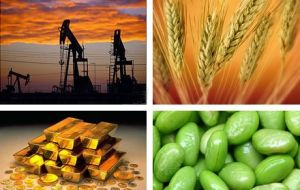MercoPress. South Atlantic News Agency
Latin America's fast growing decade is coming to an end, anticipates IMF report
 The key risk is a sharper decline in commodity prices caused by weaker demand
The key risk is a sharper decline in commodity prices caused by weaker demand The IMF’s Regional Economic Outlook for the Western Hemisphere, released on Thursday in Lima, Peru, projects regional growth of 2½ percent in 2014, down from 2¾ percent in 2013. Weak investment and subdued demand for the region’s exports held back activity in 2013, as did increasingly binding supply bottlenecks in a number of economies. For 2015, the IMF projects a modest pickup, to 3%.
According to the report, Latin America still faces a number of downside risks. The key risk is a sharper decline in commodity prices caused by weaker demand from some of the major commodity-importing economies, especially China. Although the effects from a gradual and orderly normalization of US monetary policy should be contained for most of the region, increased capital flow volatility also remains a risk.
Growth in the financially integrated economies—Brazil, Chile, Colombia, Mexico, Peru, and Uruguay—in 2014 is expected to remain the same as in 2013, at 3½ percent. However, the average growth number masks considerable divergence across countries.
Mexico’s economy is expected to rebound to 3% this year owing to a stronger US recovery and normalization of domestic factors. In Brazil, activity is expected to fall below 2%t in 2014, as weak business confidence continues to weigh on private investment.
The IMF said the key policy priorities for the financially integrated countries include a careful calibration of macroeconomic policies, a clear focus on reducing financial vulnerabilities, and stepped-up structural reforms to remove obstacles to growth.
Growth in the other commodity exporters—Argentina, Bolivia, Ecuador, Paraguay, and Venezuela—is projected to fall sharply in 2014, to about 2¾ percent from nearly 6% in 2013. The IMF said that fundamental policy adjustments are needed in Venezuela to avert the risk of disorderly dynamics.
Further policy adjustments are also needed to restore macroeconomic stability in Argentina, especially in the context of less favourable prospects for global commodity prices. The other economies in this group will also need to control levels of public spending, which have increased sharply over the past decade owing to strong commodity revenue.
Economic activity in Central America is projected at about 3½ percent in 2014, similar to last year’s level. Looking ahead, the IMF pointed out that a consolidation of public finances is necessary to reduce fiscal and external imbalances, and to ensure debt sustainability. Consolidation efforts would have to include both expenditure restraint and higher tax revenues.
Growth remains tepid in most of the Caribbean. The tourism-dependent economies are expected to grow on average by 1.4% in 2014 and the commodity exporters by 3.2%. Reducing high public debt levels remains a key challenge in much of the Caribbean along with further efforts to address long-standing competitiveness problems, notably in the tourism-dependent economies.




Top Comments
Disclaimer & comment rules-

-

-

Read all commentsWho’d have thunk it?
Apr 25th, 2014 - 11:07 am 0“ The key risk is a sharper decline in commodity prices caused by weaker demand from some of the major commodity-importing economies, especially China.”
TGW
“gradual and orderly normalization of US monetary policy should be contained for most of the region, increased capital flow volatility also remains a risk.”
So in a nutshell prices are dropping and there will be no money from the dastardly “International Investor’s” to allow countries to fund alternative measure to replace the lost incomes and in The Dark Countries case the overblown tax revenues.
This is when the bastard Tupas communists in Uruguay who have fucked the economy from now for the next three generations at least will fold under the relentless pressure of having no money to pocket for themselves.
It had to come to an end at some point...
Apr 25th, 2014 - 11:54 am 0Cachanosky or De Pablo said in 2012 that at mid decade the prices will plateau and then decline progressively.
The mentality of we are “condemned to success” in Argentina of the last decade has being very negative. It generated a mentality of no need for efficiency no inovation and a generalized idea that there is no problem in having a huge State taking care of everything and taxing the farmers for the would always be rich.
900 bn USD came into the coffers in the last 10 years and now they are crapping the barrel to find USD to pay for fuel. Pathetic.
What a waste.
@CD
Apr 25th, 2014 - 12:18 pm 0the cyclical nature of commodity prices has been observed long before 2012. When prices started ramping up in 2003 the Chilean government made it policy to put the excess in to a kind of sovereign wealth fund to be used on the down side of the cycle.
Norway has been doing this for decades and now has over $800 billion in their wealth funds .... if only we had oil!
Argentina has managed to do completely the opposite. They have gone through the boom and managed to come out the other side with reserves critically low and no wealth fund. I agree it is a total waste.
Commenting for this story is now closed.
If you have a Facebook account, become a fan and comment on our Facebook Page!